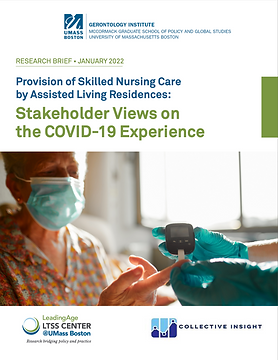Technical Reports

The Community Catalyst Center for Consumer Engagement in Health Innovation and the LeadingAge LTSS Center at UMass Boston jointly funded this case study review of the One Care Implementation Council. The One Care Implementation Council was established in 2013 to ensure stakeholders assume an active role in the implementation of Massachusetts’ Financial Alignment Initiative. In 2018, Collective Insight conducted a series of key informant interviews and a web-based material review with One Care Implementation Council stakeholders and authored the resultant case study. The report is intended to be a resource for policymakers, health care leaders, advocates and program enrollees nationwide who want to develop or enhance similar Councils in their own states.
Erin McGaffigan, Ph.D and Kevin J. Mahoney, Ph.D. co-authored this 2012 research issue brief from the National Resource Center for Participant-Directed Services (NRCPDS), in partnership with contributors Althea McLuckie and Molly Morris. The research issue brief summarizes the findings of a three-state in-depth study on participant engagement practices within Cash & Counseling programs.
Guiding Principles for Partnerships with Unions and Emerging Worker Organizations When Individuals Direct Their Own Services and Support. Service Employees International Union
This document by Erin McGaffigan, Ph.D., Bob Kafka, Tom Nerney, Kevin J. Mahoney, Ph.D., Mary Kay Henry, Kirk Adams, Leslie Frane, and Mike Oxford details the strength that may be garnered by a coalition of self-directed individuals and their direct support workers. The Guiding Principles listed are a result of a collaboration between ADAPT, The Center for Self-Direction, The National Resource Center for Participant-Directed Services, The Service Employees International Union, and The Topeka Independent Living Resource Center.
Erin McGaffigan, Ph.D., in partnership with the National Resource Center for Participant-Directed Services (NRCPDS), worked with state partners, advocates, and program participants to identify key budget concerns that put participant direction at risk. This Toolkit, published in 2010, is intended to serve as a resource for informing decision-making during these difficult times.
This paper, developed by Erin McGaffigan, Ph.D. for Rutgers/NASHP and published by the HCBS Clearinghouse in 2008, explores the various participant-direction models, existing quality management strategies, and the potential for change that allows participant-directed quality management systems to remain true to the core values they were founded upon.
This 2006 final report explores consumer involvement within the Massachusetts Real Choice and Independence Plus Grants, while reviewing the history and effectiveness of consumer involvement strategies. Erin Mcgaffigan, Ph.D. acted as the Project Advisor in partnership with Darlene O'Connor, Ph.D., and project leader Nicole Lomerson, MPH. Keith Jones, President of SoulTouchin’ Experiences, also assumed a leadership role in the production of this report.
Report from the LeadingAge LTSS Center @UMass Boston and Collective Insight shares the experiences of residents, family caregivers, and nurses in Massachusetts assisted living residences (ALRs) during the pandemic, when an executive order allowed ALR nurses to deliver certain basic health services such as giving injections, dressing simple wounds, and applying ointments and drops.
.png)









